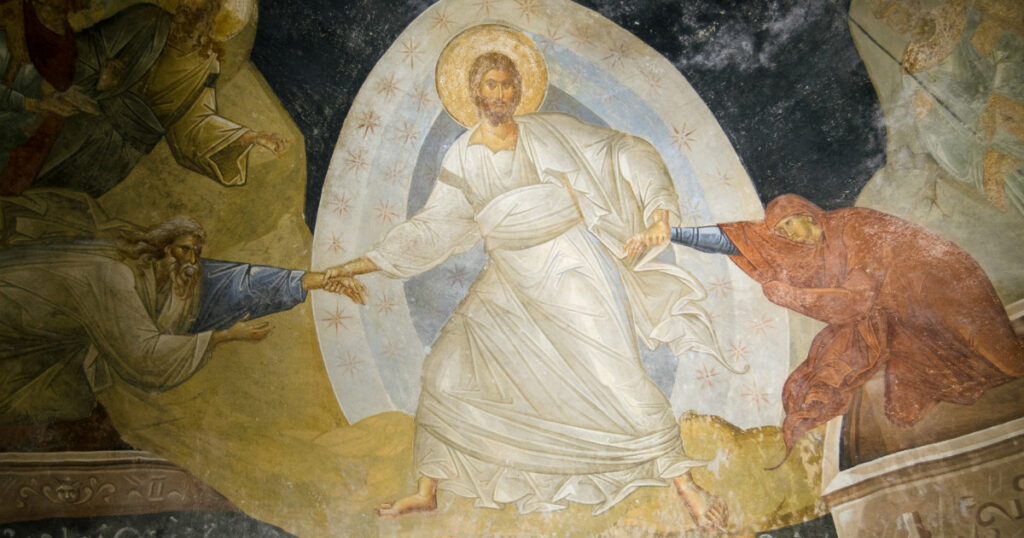by Matthew C. Harrison
The New Testament is the apostolic witness to the words and works of Jesus, both while He walked this earth as the God-man, and as He works by His blessed Word and Spirit after His resurrection and ascension. The church grows by the witness of the Gospel of free forgiveness in Jesus. The resurrection was and remains the heart of that unchangeable message. Thus, Peter preached, “This Jesus, delivered up according to the definite plan and foreknowledge of God, you crucified and killed by the hands of lawless men. God raised him up, loosing the pangs of death, because it was not possible for him to be held by it” (Acts 2:23–24).
The chief gift and task of an apostle was to witness to Jesus’ resurrection. When Matthias was chosen to replace Judas, he was chosen from among two men who had been with them from the beginning of Jesus’ ministry. And “one of these men must become with us a witness to his resurrection” (Acts 1:22).
The risen Christ appeared to Paul, converted him and made him a witness as one “untimely born” (1 Cor. 15:8). That is, St. Paul was born again when Christ appeared to him years after His resurrection. Paul’s witness to the truth of the resurrection was and remains powerful. First Corinthians 15 asserts Christ’s resurrection with the most intense historical certainty. The witness is still captivating:
For I delivered to you as of first importance what I also received: that Christ died for our sins in accordance with the Scriptures, that he was buried, that he was raised on the third day in accordance with the Scriptures, and that he appeared to Cephas, then to the twelve. Then he appeared to more than five hundred brothers at one time, most of whom are still alive, though some have fallen asleep. Then he appeared to James, then to all the apostles. Last of all, as to one untimely born, he appeared also to me. (1 Cor. 15:3–9)
Paul, like the rest of the apostles, was convinced of the resurrection of Christ. And everything he preached depended upon Christ’s resurrection. If the resurrection were fiction, then his proclamation was myth, fiction, useless. “And if Christ has not been raised, then our preaching is in vain and your faith is in vain” (1 Cor. 15:14). I dare say to the extent that our preaching today is devoid of the resurrection, it too is in vain.
As a young pastor, I attended the funeral service of a parishioner’s relative. The relative was a member of a liberal Protestant church. I spoke with the minister at a later date.
I said to her, “I noticed that you used the traditional funeral liturgy and readings (“Ashes to ashes, dust to dust, we lay these earthly remains of N.N. to rest in the sure and certain hope of the resurrection”). Do you really believe the body you buried will rise again?”
“Oh no… certainly not,” she replied.
“Well, do you believe that Jesus’ body rose again?”
She said, “I’m not sure, but something happened.”
Consider what Paul said:
Now if Christ is proclaimed as raised from the dead, how can some of you say that there is no resurrection of the dead? But if there is no resurrection of the dead, then not even Christ has been raised. And if Christ has not been raised, then our preaching is in vain and your faith is in vain. We are even found to be misrepresenting God, because we testified about God that he raised Christ, whom he did not raise if it is true that the dead are not raised. For if the dead are not raised, not even Christ has been raised. And if Christ has not been raised, your faith is futile and you are still in your sins. Then those also who have fallen asleep in Christ have perished. If in Christ we have hope in this life only, we are of all people most to be pitied. (1 Cor. 15:12–19)
St. Paul links Christ’s resurrection to our justification, resurrection and eternal life: “But in fact Christ has been raised from the dead, the firstfruits of those who have fallen asleep. For as by a man came death, by a man has come also the resurrection of the dead. For as in Adam all die, so also in Christ shall all be made alive” (1 Cor. 15:20–22).
We who have become captive to the truth of the Word of God must recall and proclaim the resurrection as did the blessed apostles. Why? The resurrection is the Gospel. “[Jesus] was delivered up for our trespasses and raised for our justification” (Rom. 4:25).
“Who shall bring any charge against God’s elect? It is God who justifies. Who is to condemn? Christ Jesus is the one who died — more than that, who was raised — who is at the right hand of God, who indeed is interceding for us. Who shall separate us from the love of Christ?” (Rom. 8:33–35). Our justification by Christ’s resurrection, accomplished before and outside of us (extra nos), is a done deal. Proclamation simply hands us beggars the plate of food and says, “Here, it’s yours.” We see here in Romans 8 how Christ’s resurrection is the keystone to our daily consolation, knowing Christ is interceding for us with the Father every minute.
“When I saw him, I fell at his feet as though dead. But he laid his right hand on me, saying, ‘Fear not, I am the first and the last, and the living one. I died, and behold I am alive forevermore, and I have the keys of Death and Hades” (Rev. 1:17–18). Christ has the keys. And He says, “I am the door. Come to me.”
Christ’s resurrection is ours in Holy Baptism. Baptism connects us with Christ. “We were buried therefore with him by baptism into death, in order that, just as Christ was raised from the dead by the glory of the Father, we too might walk in newness of life” (Rom. 6:4). “Having been buried with him in baptism, … you were also raised with him through faith in the powerful working of God, who raised him from the dead” (COL. 2:12). Nowhere does the New Testament describe Baptism as mere symbol or my act of obedience to God. “Baptism, which corresponds to this, now saves you, not as a removal of dirt from the body but as an appeal to God for a good conscience, through the resurrection of Jesus Christ” (1 Peter 3:21). Notice that Baptism is the appeal because it connects us with the resurrection of Christ.
Christ’s resurrection is the key to our lives of love and service to our neighbor. “He died for all, that those who live might no longer live for themselves but for him who for their sake died and was raised” (2 Cor. 5:15).
Luther relished saying, “Nevertheless, I am baptized!” That means I am Christ’s. Christ is mine. Christ’s birth, life, preaching, good deeds, love for His neighbor, miracles, institution of Baptism and the Supper, prayers, suffering, trial, sham prosecution, sentencing, condemnation, torture, crucifixion, death, proclamation of victory in hell, and resurrection are mine! Christ is risen! Alleluia! He is risen indeed! Alleluia, Amen.
–Pastor Harrison





